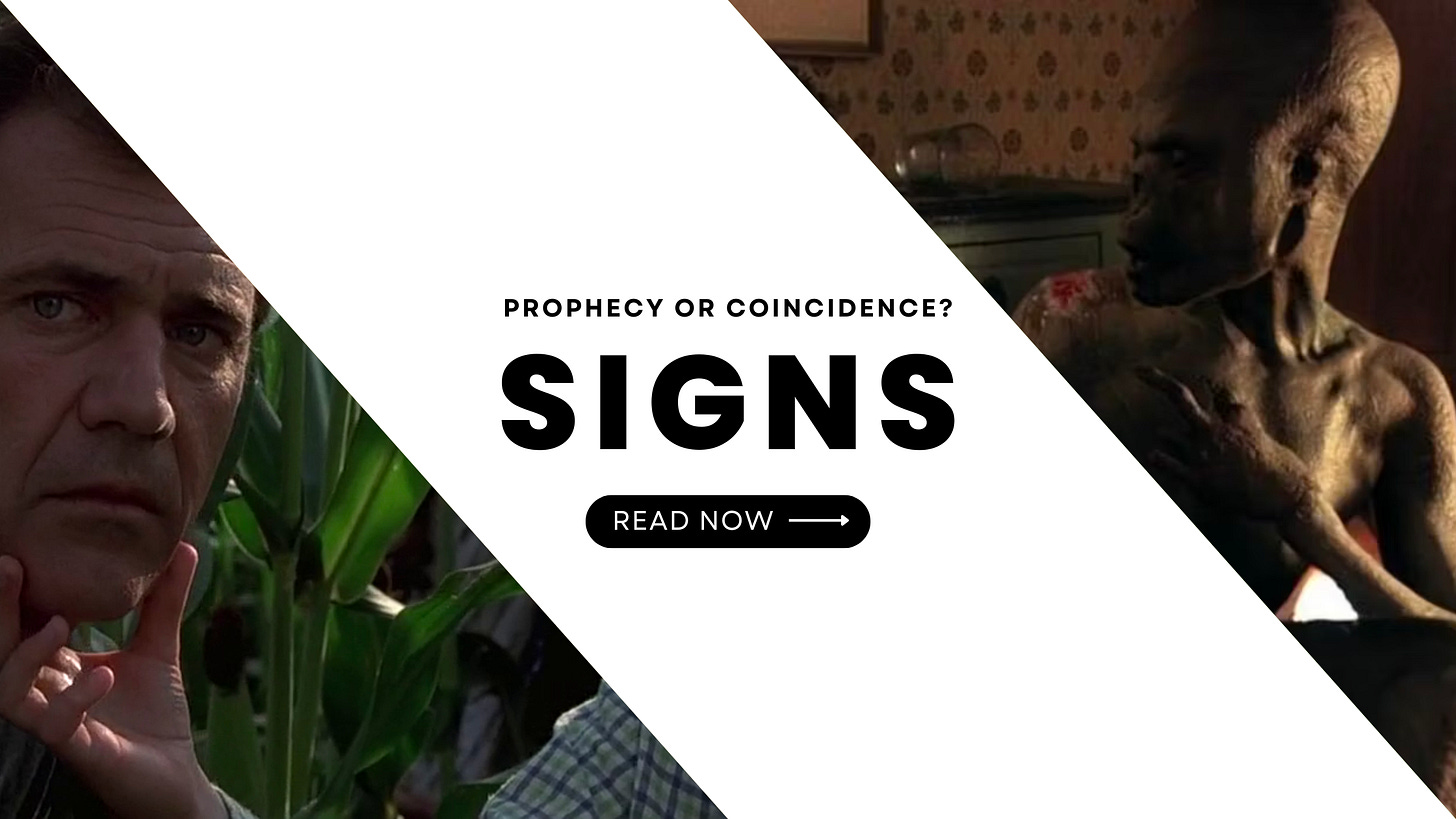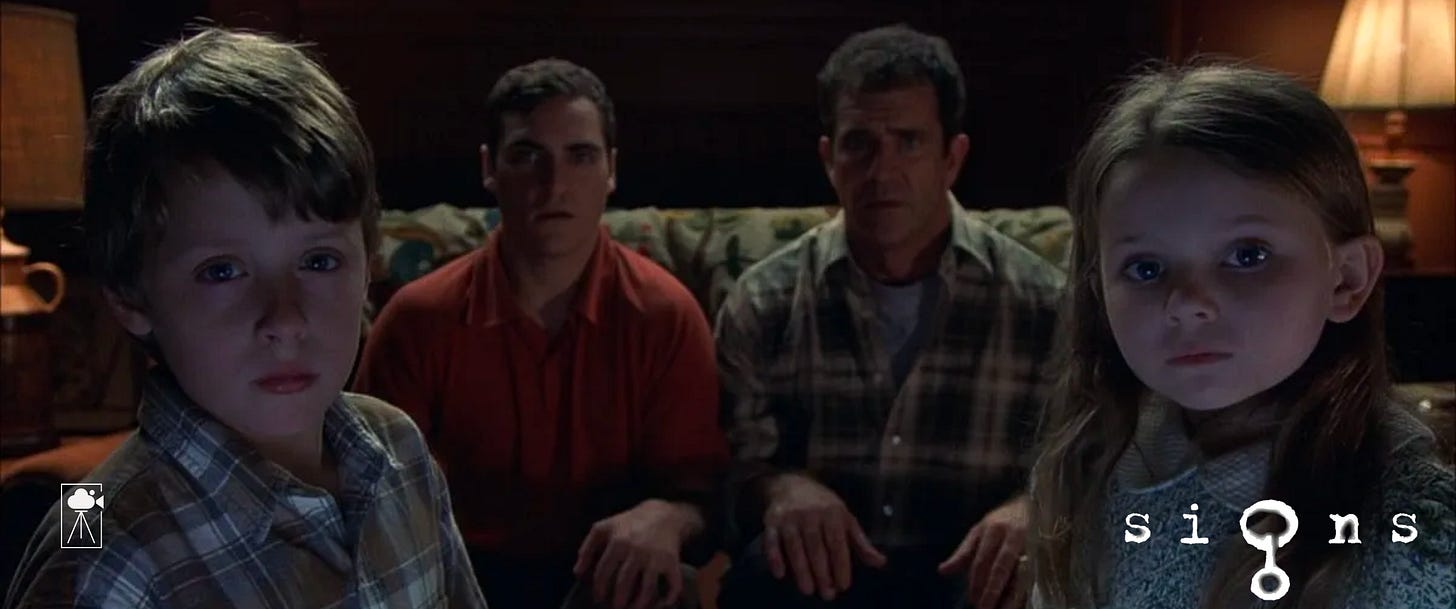SIGNS (2002) - Prophecy or Coincidence?
I’m back today with (of course) a Christian analysis of film, this time with M. Night Shyamalan’s 2002 science fiction film, Signs.
Signs and Miracles
In Signs, we follow Graham Hess, a former priest who lives with his two children and his younger brother, Merrill. Graham’s wife tragically died months earlier, causing Graham to leave the ministry and lose his faith. One day, the family finds crop circles in their fields, and soon mysterious lights hover above cities around the world.
As various news outlets speculate about what could possibly be going on, Graham and Merrill discuss whether this could be a coincidence, or a sign of things to come.
People break down into two groups when they experience something lucky. Group number one sees it as more than luck, more than a coincidence. They see it as a sign, evidence that there is someone up there watching out for them. Group number two sees it as just pure luck. A happy turn of chance…So what you have to ask yourself is: what kind of person are you? Are you the kind that sees signs, sees miracles? Or do you believe that people just get lucky? Look at the question this way: is it possible that there are no coincidences?
As the conversation continues, Graham shares the memory of his wife’s death, including her final words: “tell Merrill to swing away.” Graham says that since the nerve endings in her brain were firing as she died, a random memory of one of Merrill’s baseball games popped into her head, causing her to say that. And then she died. Finally, sadly, he concludes, “There is no one watching out for us Merrill. We're all on our own.”
As the film goes on, we discover that these lights in the sky were UFOs with hostile aliens attempting to invade the earth, with one alien making its way inside the Hess’s house. Graham and Merrill enter their kitchen in shock and horror as they see this creature menacingly holding Graham’s son in its arms.
But then? A revelation. Graham looks over beside Merrill, and sees…a baseball bat. His wife’s dying words weren’t random or even a memory. They were a prophetic message. Recalling this memory, Graham tells Merrill to “swing away,” and Merrill uses the baseball bat to help defeat the alien and save Graham’s son.
Signs in Matthew
Similarly, in the Gospel of Matthew, the author often points to events in Jesus’ life as a fulfillment of Old Testament scripture. In fact, in chapter 2 we see three events within the span of ten verses that Matthew connects back to ancient prophecies. Over the years, cynics have (fairly) pointed out that these so-called prophecies could easily be in reference to past events.
However, NT Wright, a venerated New Testament Scholar, believes these prophecies can take on multiple meanings.
Matthew writes in 2.14-15 “Joseph got up and took his wife and the child to Egypt, where they stayed until Herod died. So the Lord's promise came true, just as the prophet had said, ‘I called my son out of Egypt.’”
Here’s NT Wright’s take on the prophecy:
When he quotes Hosea 11.1 in verse 15 (‘Out of Egypt I called my son'), it looks for a moment as though he is ignoring the fact that the prophet was looking back to Israel's Exodus from Egypt, not forward to a 'son of God’ yet to come. But this itself ignores the fact that, for Matthew, part of Jesus' role and vocation is precisely to make Israel's story complete: as ‘son of God' he is, as it were, Israel-in-person, succeeding at last where Israel had failed.
Later, in 2.18, Matthew says that Herod’s slaughter of the children of Bethlehem was to fulfill another prophecy. “In Ramah a voice was heard crying and weeping loudly. Rachel was mourning for her children, and she refused to be comforted, because they were dead.”
Wright observes that there’s once again more than meets the eye here. “The passage in Jeremiah (31.15) is all about God's renewal of the covenant, bringing Israel back from exile at last. Though Israel must weep and mourn, rescue is on the way. Again, Matthew is hinting that Jesus is bringing deliverance even when everything seems bleak and hopeless.”
Lastly in 2.23 Matthew writes, “they went to live there in the town of Nazareth. So the Lord's promise came true, just as the prophet had said, ‘He will be called a Nazarene.’”
In this prophecy from Isaiah, the word nazir means ‘branch.’ A branch, says Isaiah, shall grow out of the root of Jesse; in other words, a new beginning will be made for the royal house of David. The book of Matthew is all about the new beginning that Jesus’ brings to Earth, and Matthew is finding connections in past scripture wherever he can. And it turns out, that brings about a lot of connections.
A Whole New Meaning
The character of Graham in Signs found a simple explanation for his dying wife’s words; he thought she was referencing a past baseball game. There was no reason to think further of her words because they had seemingly already passed.
Many skeptics believe that Matthew made up Jesus’ remarkable birth story to present a fulfillment of prophecy, inventing meaning where there was none. However, NT Wright suggests that Matthew’s ancestors and contemporaries didn’t necessarily see those Old Testament passages in question as prophecies to be fulfilled by the coming Messiah. “It looks rather as though [Matthew] found the verse because he already knew the story, not the other way round.”
In other words - the prophecy only took on significant meaning once it had been fulfilled. Graham had no reason to look for further meaning behind the phrase “tell Merrill to swing away.” But once the alien encounter occurred, his wife’s prophetic words finally made perfect sense. Similarly, many Jews thought nothing more of their prophets’ words, especially the ones that seemingly referenced past events. But Matthew shows us that God is doing what He’s always done, but this time for good - He’s coming to rescue His people.
Signs ends with Graham putting on his clerical collar, preparing to go back to church. The fulfillment of his wife’s prophetic words has restored his faith. The Gospel of Matthew ends with Jesus’ disciples being commissioned to go share the Good News. Jesus’ fulfillment of the Old Testament has given them newfound faith.
So what you have to ask yourself is: what kind of person are you? Are you the kind that sees signs, sees miracles? Or do you believe that people just get lucky? Is it possible that there are no coincidences?







